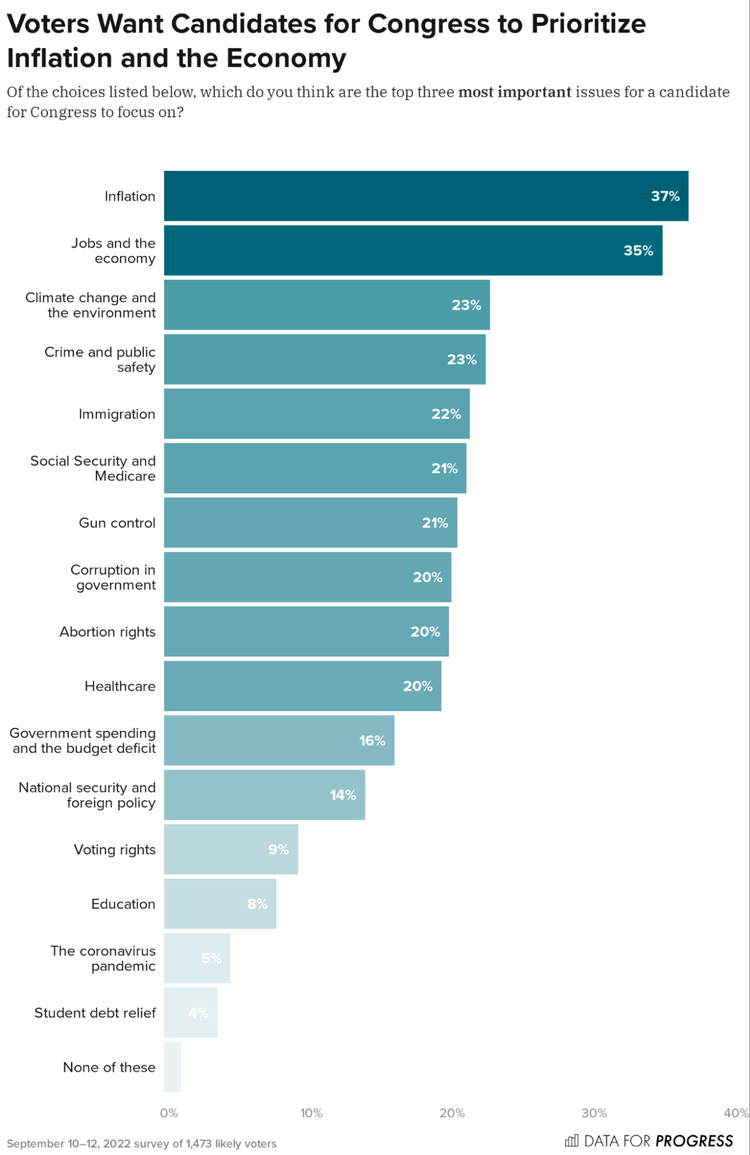Why Democrats Will Lose the 2022 Midterm Elections
It’s simple: Democrats aren’t offering a consistent and persuasive story on the economy
Nearly a week to go before the midterm elections, and it seems almost certain that the Republican Party will pick up ground and Democrats will lose seats in Congress.
There’s one simple reason: Democrats aren’t telling a good story on the economy, the chief concern among voters across the country.
Ironically, Democrats have a plan on the economy, but they aren’t telling a consistent and persuasive story about it. Republicans don’t have much of a plan on the economy, but they tell a story that connects with where people are today and the economic concerns.

It’s the economy stupid (again)
The economy and inflation remain the top priorities of voters this fall, a point that’s been pretty consistent in polls since summer.
This opinion landscape in America should have focused Democrats on building their case on the economy and presenting a contrast with Republicans sooner. When inflation runs as high as it is, it makes incumbents vulnerable in America and around the world, too.
Democrats continue to bleed working-class voters, and for much of this cycle Democratic candidates haven’t talked about working-class concerns. Instead, they’ve focused on abortion rights, gun control, and safeguarding democracy, all important issues with some connection to working-class voters. But this narrative hasn’t connected with these voters on a level that matters.
Belatedly, some Democratic voices have woken up and reminded candidates that the party needs to convince voters the party cares about their economic well-being, as if offering this insight less than three weeks before the election will matter. We’ll see.
Entering the homestretch of the midterms, President Biden and Democrats have taken to reminding people how Republicans will increase costs for American families, an eleventh-hour attempt that’s important to try but probably hard to convince people with as inflation hit a 40-year high this year.
Add to these economic woes the challenges of crime, with a record-high 56% of U.S. adults reporting they think crime has increased where they live, and the makings of a “change” election are present in America today.
The missing link to the rest of the world
Another aspect missing from the case Democrats are trying to make to the electorate: the link between the priority concerns of voters at home and what’s going on in the world. Economic challenges including high inflation are the product of multiple factors including the sharp increase in demand after the forced shutdown of the economy during the pandemic. But a good bit of it is linked to global dynamics such as supply chain snarls and pressures on energy and food prices globally due to Russia’s war against Ukraine.
The Biden administration has not painted this picture in a cohesive way that links domestic challenges and opportunities with these global dynamics, even though the American public at some level understands this connection and has an appetite for arguments that tell them what we’re doing to help American workers and companies stay competitive.
On the rare occasions President Biden has stepped out of the bubble and spoken directly to the American public, as he did when he traveled to Ohio in early July before his magical mystery tour of the Middle East, he has done a good job connecting the dots for voters.
But just weeks before the midterms, however, his foreign policy team then released a series of mostly impenetrable, wonky national security papers discussed only in elite circles and written in language that most Americans don’t understand. It’s a real missed opportunity.
Before you accuse me, take a look at yourself
With a week to go, nothing is set in stone, and dynamics could turn in a positive direction for Democrats - and we may not know the full results until weeks after the election.
But if things go the way they seem to be trending for the Democrats, the blame game will begin immediately. A circular firing squad will quickly emerge. More talk will emerge about possible primary challenges to President Biden in 2024. Much of this post-election debate will avoid the bigger picture questions, including why America is incapable of building stable majority political coalitions and how the political duopoly dominating politics benefits from the status quo.
Some Democrats will look to explain away the losses by saying their opponents and those who voted for them are inherently racist or budding autocrats. Others will look to Vladimir Putin or the Saudi government as the boogeymen that ruined the midterm elections.
But there’s one other place Democrats will need to look for lessons about the likely political losses to come: the mirror.




